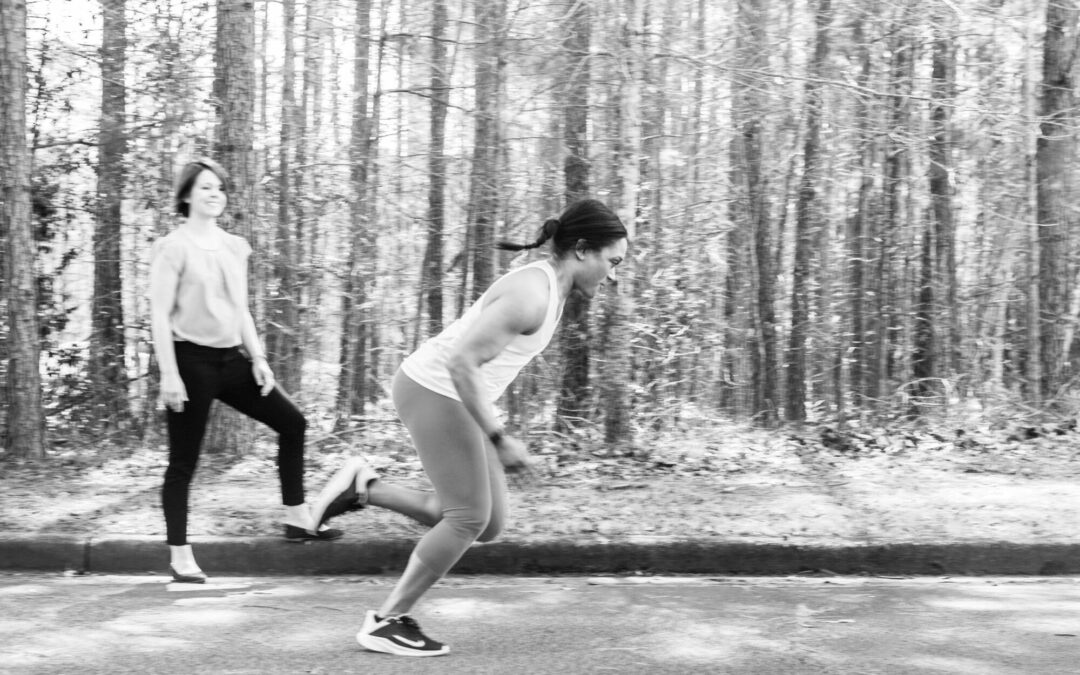Let’s talk about female athletes and pelvic floor muscle health!
One of the most common conditions we see here at our pelvic physical therapy clinic is stress urinary leakage with jumping, running or heavy weightlifting. The second type of pelvic floor dysfunction we see prolapse symptoms with those same activities.
So these are both different in nature as to why they are caused and the symptoms involved, but can have some similar reasons as to why they’re happening.
In this blog post we are going to address urinary leakage with female athletes. We will also be posting another blog about prolapse and female athletes!
First, female athletes can range anywhere from preteen years all the way to 50 years old and beyond. AND I consider an athlete anyone who exercises regularly and moves their body in ways that make them happy and stay active.
Stress urinary leakage can happen for several reasons. The pelvic floor muscles support the organs, bladder, bowel, uterus, and are very important when it comes to helping you support the bladder and not leak urine while you are exercising, jumping or running.
Here are some main reasons why you could be having urinary leakage:
1. Overactive/Tense Pelvic Floor Muscles. When it comes to the pelvic floor, there can be a length tension relationship that’s not supporting the urethra very well. Let’s talk about length tension relationships. If the pelvic floor muscles don’t have the ability to fully relax, because yes, relaxing pelvic floor muscles is just as important as contracting them, then you may not be fully emptying or getting good support to the urethra, because the muscles are always staying high and tight.
2. Power or Endurance Of Pelvic Floor Muscles. There can be weakness of the pelvic floor muscles due to several reasons. It could be from fascial connective tissue changes, such as having any tearing during a vaginal delivery, or strain on the pelvic floor with a pregnancy. A strain or tear pelvic floor muscles could create changes and how those muscles are again supporting the bladder and the urethra. Changes of muscle performance through time with hormonal changes, with history of low back pain/hip pain, and not using the pelvic floor muscles effectively. The pelvic floor muscles not only provide support externally with closing to support the urethra and internally with lifting to support all the organs in the pelvic floor. So if there’s a strength deficit, meaning you can’t create enough force around the urethra and support the bladder, then there can be urinary leakage with running and jumping and heavy weight lifting.
3. Coordination Of The Pelvic Floor Muscles. The other reason could be pelvic floor muscle incoordination or dyssynergia. The muscles are not effectively coordinating with your movement and breath. This could affect your intra-abdominal pressure management– pressure between your diaphragm and pelvic floor. You could be leaking because you’re not coordinating those muscles again and not supporting the urethra well.
4. Difficulty Managing Intra-Abdominal Pressure Management. This is the pressure within your abdominal cavity, between the diaphragm and the pelvic floor muscles, which we envision like a canister or a soda pop can. If we have a difficult time managing our pressure in our abdomen, whether that’s through coordination, difficult to get in a deep breath for rib cage expansion. You could also have difficulty supporting enough pressure and force in your abdominal activity from the pelvic floor muscles below (i.e. power of the muscles). The impaired intra-abdominal pressure can contribute to urinary leakage due to pressure above in the abdomen not being
5. Biomechanics With Movement. Your form during running, lifting or jumping can contribute to why you may be leaking as well. There may be something you could be doing changing with your running form, jumping form or lifting form to optimally again help you with the intra-abdominal pressure management and decrease the urinary leakage. Your form can effect how you are optimally using your pelvis/spine, legs, and muscles with your type of exercise.
6. Bladder/Bowel Health Contributions. Bowel health such as chronic constipation could also be a contributing factor to urinary leakage with exercise. This can contribute to internal pelvic floor congestion due to the ability for the colon to expand and in some cases become a megacolon. There could also be difficulty with completing emptying the bladder associated with overactive pelvic floor muscles. This could be either not emptying all the way, or over holding your urine throughout the day. As a general guideline, urinating every 2-4 hours is a good interval to urinate even when hydrated really well.
Just to be clear you didn’t see that doing Kegels will help you from not leaking urine. That would imply you are weak in the pelvic floor muscles which is why you are leaking urine. But as you see above pelvic floor muscle weakness may only be one reason, but not the reason you are leaking during exercising.
If you are struggling with urinary leakage while exercising or working out, it is important for you to know you can continue to do the movements you love WITHOUT leaking urine. A pelvic physical or occupational therapy evaluation is important so you can find the primary drivers to your leakage. So we can fix it without depending on medications or having to wear a pad while you are exercising!
If you want to know if pelvic physical therapy is a right fit for you or you would like to book an appointment you can reach out to us here. You are not alone if you are leaking urine! If you are experiencing symptoms of endometriosis, please reach out to us via a phone call or fill out a form here.


Recent Comments